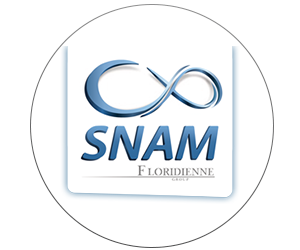Website: www.snam.com
SNAM was formed as an offshoot of the metallurgical industry in 1981, and from the 1990s has established itself as a major player into the “loop economy”. SNAM’s wealth of experience and renowned expertise make it one of few companies in the world to have mastered the techniques for processing batteries and accumulators. A French company, subsidiary of the Floridienne Group (chemistry division), SNAM is employing arround 100 people in two sites in France (Viviez and Saint Quentin Fallavier). The company enjoying continuous growth: European environmental 14001 Certification; acquisition of specialised subsidiaries (sorting of mixed batteries, galvanisation processes, etc).
Its core activity is the recycling of rechargeable batteries (Nickel cadmium, Nickel Metal Hydride, and lithium ion). SNAM is an European leader for the following activities: recovery of cadmium, recycling of NiCd, NiMh and Liion battery. It also recycles alkaline and zinc carbon batteries and has developed sorting and battery recognition facilities. Its supplies come from a network of European and international collectors of spent portable and industrial batteries.
SNAM is acting in all European countries (95% of its turnover), but is also active in Northern and Southern America, Asia or the Middle East. Its activity concentrates mainly on the recycling of portable batteries coming from gross collection schemes, as well as industrial batteries coming from industrial partners. In that aspect, SNAM has a historical collaboration with the French and German manufacturers of NiCd batteries SAFT and Hoppecke.
On the other side, SNAM developed recently contractual agreements with international groups from the automotive industry such as Honda, Toyota, PSA Volkswagen or BMW. These agreements concern the collection in Europe and the recycling of their end-of-life EV and HEV batteries, as well as their production waste.
SNAM’s role as a partner in the recycling industry is a key link in the circular economy chain. Our activity helps mitigate:
– the environmental impacts tied to mining valuable commodity ores and minerals (nickel, cobalt, cadmium) in farflung countries and
– the CO2 emissions tied to importing them back into the EU.
Furthermore, by looping these materials back into the economy, we help minimize the amount of waste landfilled on EU territory.



